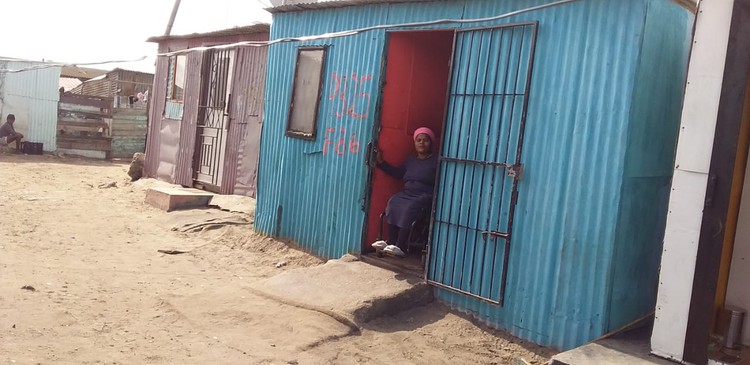Life in a shack when you’re in a wheelchair
Every day Nonceba Siyobi sits in the doorway of her home hoping a passerby will help her to the nearest toilet
Nonceba Siyobi in Phola Park informal settlement, Gugulethu, sitting in the doorway of her shacks so she can ask someone to help her to the toilet or to collect water for her. Photo: Mary-Anne Gontsana
People with disabilities often have difficulty accessing fundamental rights, and living in a shack in an informal settlement only exacerbates these challenges.
Nonceba Siyobi is 47. She has been living in Phola Park informal settlement in Gugulethu, Cape Town, since she was 18.
Siyobi was diagnosed with polio when she was two . “I started out using crutches, but as I grew older my situation got worse and my body became too much for the crutches. I ended up in a wheelchair,” says Siyobi.
When GroundUp visited her, she was sitting in her worn out wheelchair in the doorway of her tiny shack. Siyobi says she sits there most afternoons and evenings, hoping a passerby will help her to the toilet or to replenish her water at the communal tap about three shacks away.
“The tap is far from me and I cannot access it by wheelchair. Getting around is a mission; there is a lot of sand here. When I use the communal toilet stall, I have to leave my wheelchair outside because it cannot fit inside. To relieve myself, I have to hold onto my wheelchair so I can move onto the toilet seat,” she says. “And while I’m in the toilet, I worry that my wheelchair will be stolen by the criminals in the area.”
Siyobi says one of her fears is that she’ll be stuck alone in her shack when a fire breaks out near her home. “I wouldn’t be able to make a getaway,” she says.
Siyobi is unemployed and relies on her disability grant and the little her boyfriend makes doing piecemeal work. The couple have two children, aged 20 and 13, who live with Siyobi’s mother because her shack is too small.
“Every time I think of my situation, I feel sick. I also have other health issues like high blood pressure and a heart disease.”
She says she enjoys sewing and hopes to get a better one after the lockdown so she can start making items to sell to take care of her children.
“My biggest wish would be to get a house with a toilet and not have to worry about my wheelchair being stolen. Getting a motorised wheelchair [would be nice],” says Siyobi.
Mayco Member for Water and Waste Xanthea Limberg told GroundUp there are 722 households in Phola Park who share 57 full-flush toilets and 21 taps.
“There are two major constraints to the City’s ability to provide additional infrastructure here, namely that the settlement was established on a floodplain, which legally prohibits further installation, and the other being a lack of space due to density,” she said
Next: Covid-19: Workers at Kromberg & Schubert down tools
Previous: Covid-19: Union accused of “storming” hospital, putting staff and patients at risk
© 2020 GroundUp.
This article is licensed under a Creative Commons Attribution-NoDerivatives 4.0 International License.
You may republish this article, so long as you credit the authors and GroundUp, and do not change the text. Please include a link back to the original article.



